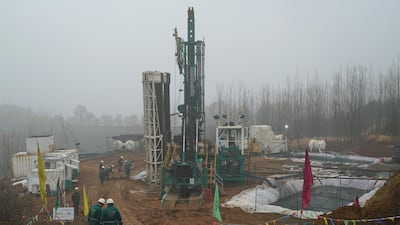Emissions of methane – a greenhouse gas – fell by about 10 per cent in 2020, largely due to lower oil and gas production amid the Covid-19 pandemic, according to the International Energy Agency.
Oil and gas companies released more than 70 million tonnes of methane into the atmosphere last year, the Paris-based agency said in a report on Monday.
The amount of methane emitted in 2020 is equivalent to carbon dioxide emissions from all of the EU countries.
Methane is far more potent than carbon dioxide, which is more commonly cited as the biggest contributor to global warming.
"The immediate task now for the oil and gas industry is to make sure that there is no resurgence in methane emissions, even as the world economy recovers, and that 2019 becomes their historical peak," Fatih Birol, the IEA's executive director, said.
Efforts to decarbonise economies by ensuring early action on controlling methane emissions will be "critical" in avoiding the worst effects of climate change, he said.
Energy-related carbon emissions fell by about 7 per cent last year, as countries introduced strict mobility restrictions to contain the spread of the virus. The drop is the steepest historically and is about five times the decline after the global financial crisis.
Tackling methane emissions has become critical for energy companies as the gas, which has a relatively shorter atmospheric lifetime of around 12 years and is present only in trace amounts, captures more heat while it lingers in the air.
Methane emissions climbed to highest levels on record by the end of 2019, reaching 1,875 parts per billion, which was more than two and a half times pre-industrial levels, according to the Global Methane Budget.
While global agriculture and animal husbandry add to methane emissions, the oil and gas sector is also a huge contributor.
"Reducing methane emissions from oil and gas operations is among the most cost-effective and impactful actions that governments can take to achieve global climate goals," the IEA said in its report on mitigating the effects of the pollutant.
Large-scale "leaks" of methane dropped in 2020 as a result of the pandemic, according to the agency.
However, the emission levels for methane would have to decline to around 20 million tonnes annually by 2030, a drop of more than 70 per cent from the levels seen in 2020, as per the IEA's sustainable development scenario.


